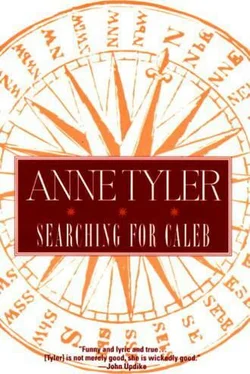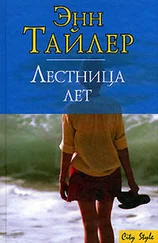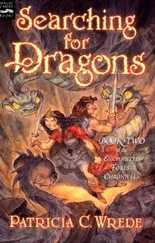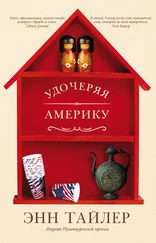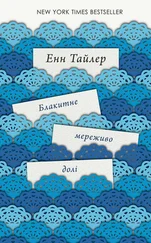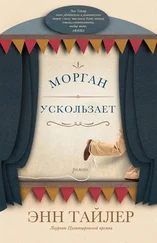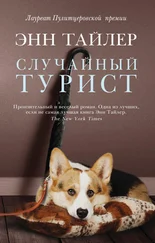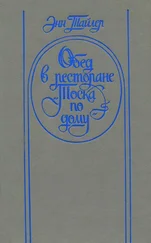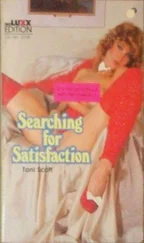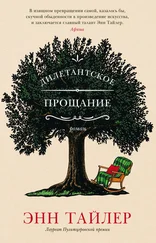“His latest expenditures are downright bizarre ,” her uncle said. “Why would he want to bribe a florist?”
“I’ll take care of it.”
She climbed into the car, and Duncan started the motor. “Finally,” he muttered. Then they were off, zooming down the road scattering a cloud of maple-seed propellers while Justine leaned out the window to wave. Aunt Lucy shouted something. “What?” Justine called. Aunt Lucy shouted again.
“Duncan, stop,” said Justine. “Your mother’s trying to tell us something.”
Duncan slammed on the brakes. The car whined into reverse. “What?” Justine called.
“I said, Don’t forget to rest your linens! ”
Duncan clapped a hand to his head, but Justine only nodded and called, “Thank you, Aunt Lucy,” and blew her a kiss, and then more kisses for all the others, until Duncan jerked the car into forward again and bore her away.

17
Duncan had been playing solitaire for months now, but nobody guessed it had been that long because at first he had kept it a secret. At first he always did. Like an alcoholic hiding his bottle while everyone else drinks in public, he had stashed decks of cards in out-of-the-way places and he played in uncomfortable and poorly lit corners. At the smallest sound he was ready to scoop his game together and look up with an innocent face and a smile. (He did not like to be caught depending on things.) But gradually, drugged with patience and canfield and accordion, he forgot his surroundings and forgot to hide the cards, then failed to notice when someone came upon him, then finally wandered into the living room absent-mindedly and laid out his game in the center of the floor where everyone had to stumble over the great spread V of his legs. He played throughout meals, visits, family quarrels, and his grandfather’s wake. He returned from Baltimore carrying a suitcase in which a single deck of cards had scattered itself through everything — interleaving with the pleats of Justine’s funeral skirt and standing upright among the bristles of her hairbrush. But he didn’t bother collecting them. He took instead a double deck that had been waiting all this time behind a begonia pot, and he settled himself on the floor and laid out a hand of spider, which was his favorite, most absorbing game, requiring hours and days of deliberation and strategy and intricate plotting. He kept losing and laying out new set-ups. Justine wandered through the rooms still wearing her hat.
At the Blue Bottle, when he went, he played on a scarred wooden desk behind the counter. He swept away stacks of bills, circulars, and correspondence, clearing the large space that spider required. When the bell tinkled over the door he didn’t hear. If he had to answer a question or ring up a purchase he was annoyed, and showed it. Couldn’t they see he was busy? By now he despised antiques. He despised the people who collected them — artificial-looking ladies who had, no doubt, thirty years ago thrown away the identical beechwood rolling pins that they were now rebuying at such exorbitant prices. And to make it worse, Silas Amsel had become a nuisance. Once the shop had proved a success, he expected things of Duncan. He was always waiting to hear good news. Duncan couldn’t stand to have things expected of him. Gradually he sold less and less, bought fewer tools, behaved more rudely toward the customers. Silas began to complain. He mentioned trivial lapses: the few times Duncan had forgotten to lock up, and the mornings he was slightly late. There was a misplaced bronze he claimed had been stolen. (As if anyone would bother stealing an object so ugly, or so heavy.) There were little spats and insults every time Silas came to the shop. And he came more and more often, and stayed longer, and meddled more. He would start grumbling even before he was fully inside. He would stand in the doorway, shaking his head. Duncan pretended not to see him. (Sometimes he really didn’t see him.) He remained seated, pondering over a vast network of playing cards, one finger hooked in a bottle of Old Crow. He felt the air turning gluey with the weight of other people’s disapproval, suspicions, hopes, preconceived notions. Only Justine allowed him to go unclassified.
Justine trailed through the shop and out again with the crumpled streamers of her hat fluttering indecisively.
“I’ll be finished in a minute,” he called, and she said, “Hmm?” and returned, vaguely. She did not shut doors behind her; so for her the antique sleighbell was forever still, a fact he appreciated. She lacked finality. She was the other shoe which never dropped. He looked up from his cards and sent her a smile so deep and sudden that it would surely have wiped all the forlornness off her face if she had seen it, but she didn’t. She was studying a chipped paperweight. She looked lost. Nowadays all she would talk about was her grandfather, his wishes she had not granted and gifts she had not thanked him for. She did not mention Caleb. Duncan waited for her to, but she didn’t. Now it was October and if she were disappointed, leafing through the mail every morning with her listless, uncertain fingers, she didn’t show it. She merely returned to the same old subject: she unwrapped the past endlessly, untying the ribbons, removing the tissue, untying more ribbons. “Do you remember when he took us on the train? I don’t know where to. He took all us children, it was some kind of outing. Some patriotic occasion of some sort. I believe he was sorry before we’d even left the depot but it was too late to back out and he didn’t want—”
Duncan couldn’t remember. He suspected that he had been left at home. But he didn’t say so to Justine. He watched her turning the crystal paperweight, and peering into it, and then raising her eyes to examine without interest her own reflection in an ormolu mirror. “Look at me,” she said, “I’m one of those eccentric old ladies you see on the street, with a beat-up hat and a shopping bag.”
But to him she was an awkward girl-cousin wearing very long shoes, and the comical up-dip at the ends of her hair was enough to make him leave his cards and come set a kiss on her cool cheek.
“You might find me going through a trash basket,” she said, still to the mirror. She ignored his kiss.
“Maybe we should take a trip,” Duncan told her. “Somewhere we’ve never been.”
“Children would make bets on what I carry in my string bag.”
But her bag was straw, not string, and he knew what she carried. Coffee beans, and salty things to nibble on, and the future wrapped in a square of rotting silk. Hadn’t she always? She turned from the mirror, as if guessing his thoughts, and opened the bag to show him. He saw neither food nor cards but only sheaves of yellowed photographs belonging to her grandfather. Aunts and uncles standing around in the ocean, by waterfalls, beside new cars; cousins holding up fish and diplomas and Bible-study trophies; Grandfather Peck carefully posed, 8 × 10, behind an enormous empty desk, beneath a parade of Maryland Digests and ALR volumes; somebody’s bride; somebody’s baby; Duncan laughing; Great-Grandma guarding her soul against theft by camera; more uncles; more aunts at someone’s garden party, clustered together with their faces frozen in surprise. (They would run to a mirror just beforehand and then run back, level, bearing their chosen expressions as carefully as jellies on a platter.) Justine snapped her bag shut again. She gave him a long measuring stare that turned him cold. “That’s what I carry,” she said, “but don’t tell the children.”
Then she walked out. The bell quivered but kept silent. Duncan thought of going after her — asking at least where she was headed, or whether she would be there to fill the house for him when he got home. Or most important: what he had done to make her look at him that way. The way other people had looked at him all his life. All his life they had marked him as thoughtless and mischievous, wicked even; yet he had continued to feel that somehow, underneath, he was a good man. With Justine, he was a good man. Had she changed her mind about him? He didn’t want to know. He didn’t want to ask, and have to hear her answer. In the end all he did was return to his game of solitaire.
Читать дальше
